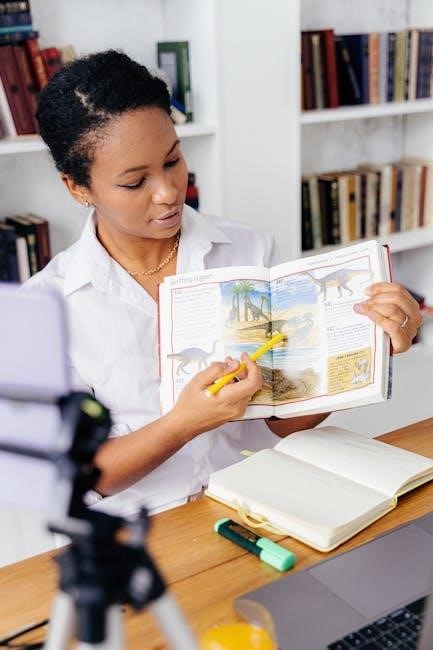
action research a guide for the teacher researcher
Action research is a systematic, solution-oriented inquiry approach empowering educators to identify and address teaching challenges through reflective, cyclical processes. It enhances practices, fosters collaboration, and promotes professional growth.
1.1 Definition and Purpose
Action research is a systematic, solution-focused approach to investigating and improving educational practices. It involves a cyclical process of planning, action, observation, and reflection to address specific challenges in teaching and learning environments. Rooted in collaboration, action research empowers educators to identify problems, experiment with solutions, and refine their practices. Its primary purpose is to enhance teaching methods, improve student outcomes, and foster professional development. By engaging in action research, educators become active participants in generating knowledge that is directly applicable to their classrooms. This approach emphasizes practical outcomes, encouraging teachers to take ownership of their professional growth while contributing to the broader educational community.
1.2 Historical and Theoretical Foundations
The origins of action research can be traced back to the early 20th century, particularly to the work of Kurt Lewin in the 1940s. Lewin, a social psychologist, introduced the concept of action research as a method to address social issues through collaborative problem-solving. This approach emphasized cyclic processes of planning, acting, and reflecting to drive change. The theoretical underpinnings of action research are rooted in pragmatism and social constructivism, which prioritize practical application and collaborative learning. Over time, action research gained prominence in education, particularly in the 1980s and 1990s, as a tool for teacher professional development. It bridged the gap between theory and practice, encouraging educators to become reflective practitioners and researchers in their own classrooms. This historical evolution solidified action research as a transformative approach to improving educational practices and fostering teacher agency.
1.3 Significance in Educational Practice
Action research holds significant value in educational practice as it empowers educators to address specific classroom challenges and improve teaching methods. By engaging in systematic inquiry, teachers can identify issues, experiment with solutions, and reflect on outcomes. This approach fosters a culture of continuous improvement, enabling educators to adapt their practices to meet the evolving needs of students. Action research also promotes collaboration among teachers, encouraging the sharing of knowledge and strategies. It bridges the gap between theory and practice, allowing educators to apply research findings directly to their teaching. Ultimately, action research enhances student learning outcomes, supports professional development, and contributes to the broader educational community by generating context-specific solutions and innovations.

The Role of the Teacher Researcher
Teacher researchers play a pivotal role in improving educational practices by systematically investigating classroom challenges, fostering problem-solving, and enhancing professional growth through reflective and collaborative inquiry.

2.1 Concept of Teacher-as-Researcher
The concept of teacher-as-researcher emphasizes educators engaging in systematic investigations to improve teaching practices and address classroom challenges. Rooted in action research, this approach encourages teachers to reflect on their methods, collaborate with peers, and implement evidence-based solutions. By adopting a researcher mindset, teachers become active participants in educational improvement, fostering a culture of inquiry and innovation. This role empowers educators to take ownership of their professional development, ensuring that their practices remain relevant and effective. The teacher-as-researcher model bridges the gap between theory and practice, enabling educators to contribute meaningfully to the field of education while enhancing student learning outcomes. It promotes a collaborative and reflective approach to teaching, making it a cornerstone of modern educational practice.
2.2 Professional Development Through Action Research
Action research serves as a powerful tool for professional development, enabling teachers to enhance their skills and stay updated with educational trends. By engaging in systematic inquiry, educators can identify challenges, experiment with solutions, and reflect on outcomes, fostering a culture of continuous improvement. This approach encourages teachers to take ownership of their growth, collaboratively addressing problems and sharing insights. Through action research, teachers develop critical thinking, problem-solving, and leadership abilities, ultimately improving their instructional practices. It also promotes a reflective mindset, allowing educators to adapt to changing educational needs effectively. By integrating research into practice, teachers contribute to a more innovative and effective teaching environment, benefiting both themselves and their students.
2.3 Collaboration in Action Research
Collaboration is a cornerstone of action research, fostering a shared commitment to improving educational practices. Teachers working together in collaborative teams can pool their expertise, exchange ideas, and address challenges collectively. This approach not only enhances problem-solving but also creates a supportive environment for professional growth. Collaboration encourages educators to share insights, resources, and strategies, leading to more robust and innovative solutions. Additionally, it promotes a sense of ownership and accountability among team members. By involving peers, school administrators, and even students, action research becomes a powerful tool for systemic change. Collaboration also facilitates the dissemination of findings, ensuring that knowledge is shared widely within the educational community. This collective effort strengthens the impact of action research and contributes to sustainable improvements in teaching and learning.
2.4 Ethical Considerations for Teacher Researchers
Ethical considerations are crucial in action research, ensuring that investigations are conducted responsibly and respectfully. Teacher researchers must obtain informed consent from participants, protect their privacy, and avoid potential harm. They should also be transparent about their roles and the purpose of the research. Additionally, researchers must be mindful of power dynamics, particularly when students or colleagues are involved. Ethical practices require maintaining confidentiality, being honest in data collection, and avoiding biases. The dual role of teacher and researcher can present challenges, such as balancing advocacy with objectivity. Collaboration and transparency with stakeholders can help address these ethical dilemmas. By adhering to ethical standards, teacher researchers foster trust and integrity in their work, ensuring that their investigations contribute positively to educational practices and communities. This ethical framework is essential for the validity and impact of action research.

The Action Research Process
Action research involves a systematic, iterative process of identifying problems, collecting data, analyzing findings, and implementing solutions. It fosters continuous improvement through reflection and collaboration, enhancing educational practices and professional growth.
3.1 Identifying the Problem or Area of Focus
Identifying the problem is the first step in the action research process, where teachers systematically observe and analyze classroom challenges or areas for improvement. This involves gathering preliminary data, reflecting on teaching practices, and defining the scope of the issue. Teachers often identify problems through student performance, classroom dynamics, or personal reflections on instructional effectiveness. It is crucial to focus on specific, manageable issues that align with educational goals. Collaborative discussions with colleagues or students can also shed light on areas needing attention. Once a problem is identified, it is important to clearly articulate it, ensuring it is actionable and relevant. This step sets the foundation for the entire research process, guiding subsequent data collection and analysis efforts to address the identified issue effectively.
3.2 Reviewing Related Literature
Reviewing related literature is a critical step in action research, enabling teacher researchers to understand the broader context of their identified problem. This involves examining existing studies, academic articles, and educational resources to gather insights into the issue. Literature review helps identify gaps in current knowledge, inform research questions, and provide a theoretical foundation for the study. It also offers practical strategies and methodologies that have been successfully applied in similar contexts. By analyzing the work of other educators and researchers, teachers can gain a deeper understanding of the challenges and opportunities related to their focus area. This step ensures that the research is informed by existing knowledge, avoiding duplication of efforts and enhancing the validity of the findings. Effective literature review also helps in shaping the research design and data collection methods.
3.3 Data Collection Techniques
Data collection techniques in action research are diverse and tailored to the specific focus of the study. Common methods include classroom observations, interviews with students or colleagues, surveys, and document analysis of student work or school records. These techniques allow teacher researchers to gather both qualitative and quantitative data, providing a comprehensive understanding of the issue. Observations offer insights into classroom dynamics, while interviews and surveys capture stakeholders’ perspectives. Document analysis can reveal trends in student performance or instructional effectiveness. The choice of method depends on the research question and the context, ensuring that data is relevant, reliable, and actionable. By systematically collecting data, teachers can make informed decisions and develop targeted strategies for improvement.
3.4 Data Analysis and Interpretation
Data analysis and interpretation are critical steps in action research, transforming raw data into meaningful insights. Teacher researchers typically use both quantitative and qualitative methods. Quantitative data, such as survey results or test scores, may involve statistical analysis to identify patterns or trends. Qualitative data, like interview transcripts or observation notes, often undergo thematic analysis to uncover underlying themes. Interpretation involves connecting findings to the research question, educational context, and broader practices. This step helps educators make sense of their data, informing decisions about classroom practices or policy changes. Effective interpretation ensures that the research leads to actionable outcomes, ultimately improving teaching and learning environments. Clear and systematic analysis is essential for credible and impactful results in action research studies.

Planning for Educational Change
Planning for educational change involves creating strategies to address identified issues, fostering collaboration, and setting clear, achievable goals. It requires a systematic approach to implement and monitor improvements effectively in educational settings.

4.1 Developing an Action Plan
Developing an action plan is a critical step in implementing educational change. It involves clearly defining goals, outlining specific steps, and establishing timelines for achieving desired outcomes. The plan should be collaborative, involving stakeholders such as colleagues, students, and administrators. Action researchers must consider available resources, potential challenges, and ethical implications when designing the plan. The plan should also include mechanisms for monitoring progress and making adjustments as needed. Effective action plans are flexible, realistic, and aligned with the broader educational objectives. By creating a structured yet adaptable framework, educators can systematically address identified issues and work toward meaningful improvements in teaching and learning environments. This step ensures that the vision for change is translated into tangible, actionable strategies.
4.2 Implementing Changes in the Classroom
Implementing changes in the classroom is a dynamic process that requires careful execution and ongoing adaptation. Action researchers must collaborate with students, colleagues, and other stakeholders to ensure a smooth transition. Clear communication of the intended changes and their rationale is essential to gain support and participation. The implementation phase involves putting the action plan into practice, using strategies such as new teaching methods, materials, or technologies. Continuous monitoring and informal assessments help identify early successes or challenges. Flexibility is key, as adjustments may be necessary based on feedback and observations. Documenting the process and its impact ensures accountability and provides valuable insights for refinement. By maintaining a reflective and professional approach, educators can effectively translate their action plan into meaningful classroom practices that enhance student learning and engagement.
4.3 Monitoring Progress and Adjustments
Monitoring progress and making adjustments are crucial steps in the action research cycle, ensuring the effectiveness of implemented changes. Educators systematically collect data on the impact of new strategies through observations, student feedback, and performance metrics. Regular check-ins with colleagues and stakeholders provide additional insights, helping to identify areas of success or improvement. Adjustments are made iteratively, refining practices based on evidence and shared perspectives. This flexible approach fosters a culture of continuous improvement, enabling educators to respond to emerging challenges and capitalize on opportunities. By maintaining a focus on student outcomes and professional growth, teachers can ensure their action research efforts lead to sustainable and meaningful educational advancements. Ongoing reflection and documentation support the evolution of the action plan, reinforcing the cyclical nature of the research process.
4.4 Assessing the Impact of Changes
Assessing the impact of changes is a critical step in the action research process, enabling educators to evaluate the effectiveness of implemented strategies. This involves systematically analyzing data collected during the monitoring phase, such as student performance metrics, feedback from peers, and classroom observations. The goal is to determine whether the desired outcomes have been achieved and identify any unintended consequences. Educators reflect on the data, comparing pre- and post-intervention results to measure progress. Stakeholder input, including student and colleague perspectives, enriches the assessment. The findings are then used to refine practices further or confirm successful strategies. Documenting these outcomes ensures accountability and provides a foundation for future research or scaling effective practices. This step underscores the iterative nature of action research, emphasizing continuous improvement and evidence-based decision-making in education.

Writing Up the Action Research
Writing up action research involves structuring the report clearly, presenting findings effectively, and sharing results with educational communities. It requires concise, reflective documentation of the entire process.
5.1 Structuring the Research Report
5.2 Presenting Findings Effectively
Presenting findings effectively in an action research report requires clarity, precision, and engagement. Use visual aids like charts, graphs, or diagrams to illustrate key trends or patterns in the data. Summarize results without unnecessary jargon, ensuring the audience can easily grasp the implications. Highlight the most significant discoveries and their relevance to educational practice. Consider using bullet points or tables to organize complex information. Additionally, provide an interpretation of the findings, linking them to the research questions or goals. Avoid overwhelming the reader with raw data; instead, focus on meaningful insights. Effective presentation makes the research accessible and actionable, enabling educators to apply the findings to improve teaching practices and student outcomes. Clear and compelling presentation enhances the report’s impact and readability.
5.3 Sharing Results with the Educational Community
Sharing results with the educational community is a vital step in the action research process, fostering collaboration and collective growth. Present findings at professional development workshops, conferences, or through educational journals. Utilize online platforms and school newsletters to reach a broader audience. Encourage dialogue by inviting feedback and discussions, creating a space for shared learning. Collaborate with colleagues to implement changes based on the research outcomes. Sharing results not only contributes to the professional development of educators but also enriches the broader educational landscape. By disseminating findings, teacher researchers inspire innovation and improve teaching practices. Effective sharing ensures that the insights gained benefit both individual classrooms and the entire educational community, promoting sustainable improvements in education. This step underscores the collaborative nature of action research and its potential to drive systemic change.
5.4 Using Technology for Dissemination
Technology plays a pivotal role in disseminating action research findings, enabling widespread sharing and collaboration; Utilize Learning Management Systems (LMS), educational software, and online platforms to present results. Create multimedia presentations, interactive reports, or infographics to engage audiences. Leverage social media, blogs, and academic repositories to reach a global audience. Tools like Microsoft 365 Copilot can assist in generating detailed reports. Online learning activity management systems can capture and share pedagogic designs. Technology enhances accessibility, fostering dialogue and collaboration among educators. Digital dissemination ensures that insights are shared efficiently, promoting innovation and improvements in educational practices. By embracing technology, teacher researchers can extend their impact, contributing to a more informed and connected educational community. This approach aligns with the collaborative and progressive nature of action research, ensuring sustainable educational advancements.

Evaluating Action Research
Action research evaluation involves assessing its effectiveness in improving educational practices. Criteria include relevance, rigor, and impact, fostering self-reflection, peer feedback, and continuous professional development for educators.
6.1 Criteria for Evaluating Action Research
Evaluating Self-evaluation and reflection are integral to action research, enabling teacher researchers to critically assess their practices and outcomes. Through systematic self-reflection, educators identify strengths, weaknesses, and areas for improvement, fostering a deeper understanding of their instructional strategies. This process encourages teachers to examine their assumptions, question their methods, and consider alternative approaches. Documentation, such as journals or logs, supports this reflective journey, providing a record of progress and insights. Self-evaluation also promotes professionalism, as teachers take ownership of their growth and the quality of their research. By reflecting on their experiences, educators refine their skills, enhance student learning, and contribute to the broader educational community. This iterative process is central to the cyclical nature of action research, driving continuous improvement and informed decision-making. Peer review and feedback are essential components of action research, fostering collaboration and enhancing the quality of the research process. By engaging colleagues or peers in evaluating their work, teacher researchers gain external perspectives and insights that might otherwise go unnoticed. This process not only strengthens the validity and reliability of the findings but also encourages a culture of shared learning and professional development. Constructive feedback provides actionable recommendations for refining research methods, interpreting data, and implementing changes. Peer review also promotes accountability and transparency, ensuring that the research aligns with ethical standards and educational goals. Ultimately, this collaborative feedback loop enriches the research experience and contributes to the broader improvement of educational practices, making it a vital aspect of the action research cycle. Evaluation in action research serves as a catalyst for continuous improvement, enabling teacher researchers to refine their practices and achieve long-term educational goals. By systematically assessing the outcomes of interventions, educators can identify strengths, address weaknesses, and adapt strategies to better meet the needs of their students. This iterative process fosters a culture of ongoing refinement, where data-driven insights guide meaningful changes in teaching methods and classroom environments. Moreover, evaluation promotes accountability and ensures that the research remains aligned with its original objectives. Through this cycle of reflection, adaptation, and implementation, action research becomes a powerful tool for sustaining educational growth and innovation, ultimately benefiting both students and the broader educational community. Action research explores innovative methodologies, cross-cultural applications, and future trends, fostering a deeper understanding of educational challenges and solutions through collaborative, reflective, and socially conscious inquiry practices. Action research functions as a powerful tool for social learning, enabling educators to collaboratively investigate and address educational challenges. By engaging in shared inquiry, teachers develop a deeper understanding of their practices and the contexts in which they operate. This approach fosters a sense of community and mutual support, as participants learn from one another’s experiences and perspectives. The cyclical nature of action research—planning, implementing, observing, and reflecting—encourages iterative learning and continuous improvement. Through this process, teachers not only refine their teaching strategies but also cultivate critical thinking and problem-solving skills. Action research as social learning bridges the gap between individual and collective growth, creating a collaborative environment that enhances both professional development and student outcomes. This dynamic approach is increasingly recognized for its potential to transform educational practices and foster meaningful change. Action research has proven to be a versatile and effective approach in cross-cultural educational contexts, fostering collaboration and understanding among diverse groups. By engaging educators from different cultural backgrounds in shared inquiry, action research bridges gaps in educational practices and promotes mutual learning. Its cyclical process of planning, implementing, and reflecting enables teachers to adapt strategies to meet the unique needs of their students, regardless of cultural differences. For instance, studies have shown that action research can enhance literacy instruction in multicultural classrooms and improve cross-cultural communication among educators. This approach not only enriches teaching practices but also empowers educators to address challenges specific to their cultural contexts. By facilitating dialogue and exchange, action research contributes to the development of inclusive and culturally responsive educational environments worldwide. Its adaptability makes it a valuable tool for global educational improvement. Action research continues to evolve with innovative methodologies that enhance its effectiveness in educational settings. One such approach is the integration of digital tools, such as online surveys and data analysis software, which streamline data collection and interpretation. Mixed-methods designs, combining qualitative and quantitative data, provide a more comprehensive understanding of classroom challenges. Additionally, participatory action research (PAR) empowers stakeholders, including students and parents, to collaborate in identifying and solving problems. These methodologies not only increase the validity of findings but also foster a sense of ownership among participants. Innovative approaches like flipped classrooms and hybrid models further expand the scope of action research, making it adaptable to diverse educational contexts. By embracing these new methods, teacher researchers can address complex issues with greater creativity and precision, leading to more impactful educational outcomes. This evolution ensures action research remains a dynamic and relevant tool for educators worldwide. Future trends in action research emphasize the integration of technology, globalization, and sustainability. The use of AI and big data will enhance data analysis, enabling teacher researchers to uncover deeper insights. Cross-cultural collaborations will expand, fostering global perspectives on educational challenges. There will also be a growing focus on sustainability, linking action research to environmental and social justice issues. Ethical considerations will remain central, ensuring equitable and inclusive practices. Additionally, virtual and hybrid learning environments will influence research methodologies, promoting innovative approaches to classroom-based inquiries. As education evolves, action research will adapt, providing educators with dynamic tools to address emerging challenges and create transformative learning experiences. These trends underscore the potential of action research to drive positive change in education on a global scale.6.2 Self-Evaluation and Reflection
6.3 Peer Review and Feedback
6.4 Using Evaluation for Continuous Improvement

Advanced Topics in Action Research
7.1 Action Research as Social Learning
7.2 Cross-Cultural Applications of Action Research
7.3 Innovative Methodologies in Action Research
7.4 Future Trends in Action Research
